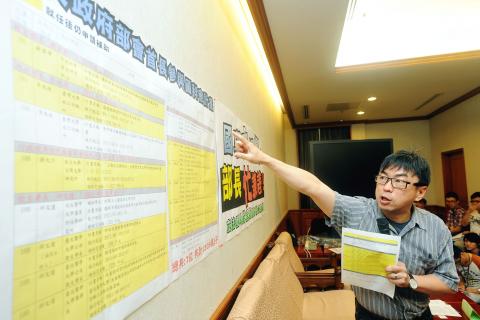Democratic Progressive Party (DPP) lawmakers yesterday accused government officials, including Premier Jiang Yi-huah (江宜樺), of seeking to take advantage of the pension reform and research programs funded by the National Science Council to enrich themselves.
A Cabinet proposal to amend the Act Governing the Recompense for the Discharge of Special Political Appointees (政務人員退職撫卹條例) would increase Jiang’s retirement pension by NT$12 million (US$400,000), DPP Legislator Chen Chi-mai (陳其邁) told a press conference.
“While the retirement pay of private and public-sector workers will shrink because of the financial problems plaguing the various pension programs, Jiang will make a fortune after the reform [of the pension system]. This act is like looting a burning house,” Chen said.

Photo: Lin Cheng-kung, Taipei Times
If Jiang retires in 2016, he will have accumulated 25 years of service — having served 17 years as a public school teacher in addition to his years of service in government — which will qualify him for pension payment, Chen said.
The proposed change in the calculation method would boost Jiang’s pension from NT$2.85 million to NT$14.87 million, he added.
Sacrificing others and benefiting oneself is not the right way to carry out pension reform, the lawmaker said.
At a separate news conference, DPP Legislator Tuan Yi-kang (段宜康) slammed Cabinet officials for doubling as project leaders in research programs sponsored or funded by the National Science Council, saying it has raised questions about their integrity and ability to focus on government affairs.
Minister of the Interior Lee Hong-yuan (李鴻源), Minister of Education Chiang Wei-ling (蔣偉寧), Atomic Energy Council Minister Tsai Chuen-horng (蔡春鴻), Council for Economic Planning and Development Minister Kuan Chung-min (管中閔), Council of Indigenous Peoples Minister Sun Ta-chuan (孫大川), Department of Health Minister Chiu Wen-ta (邱文達) and Minister Without Portfolio Schive Chi (薛琦) have all served as project leaders for the council’s programs, receiving subsidies of more than NT$15 million after assuming their current posts, Tuan said.
“It seems to me that their current posts are their part-time jobs,” he said, adding that the Cabinet members should resign from these research projects.
In response, National Science Council official Cheng Chung-fen (鄭瓊芬) told the press conference that academics who serve in the government, except those who are posted overseas, can apply for research subsidies, but they are prohibited from receiving payment from the program as long as they are still working for a government agency.
Executive Yuan spokesperson Cheng Li-wun (鄭麗文) last night called the allegations a “malicious” attempt to “defame” academics-turned-politicians.
It is “disappointing” that the DPP thinks the academics decided to work for the government for the sole purpose of “fattening their purses,” Cheng said.
The proposed amendment to the Act Governing the Recompense for the Discharge of Special Political Appointees was drafted long before the government launched plans to reform the nation’s pension systems, Cheng said.
If the proposed pension reforms were adopted, a professor who taught for 30 years and lives 20 years after retirement could receive a pension of NT$17.46 million in total, Cheng said.
Jiang would have received NT$17.46 million if he continued teaching to complete his 30 years of service in school, higher than the NT$12 million mentioned, Cheng said.
Cheng said Jiang would not be eligible to apply for pension if he leaves the government on May 20, 2016, because his years of service in academia and in government would add up to less than 25 years.
There was no truth to the DPP’s allegations, Cheng said.

Alain Robert, known as the "French Spider-Man," praised Alex Honnold as exceptionally well-prepared after the US climber completed a free solo ascent of Taipei 101 yesterday. Robert said Honnold's ascent of the 508m-tall skyscraper in just more than one-and-a-half hours without using safety ropes or equipment was a remarkable achievement. "This is my life," he said in an interview conducted in French, adding that he liked the feeling of being "on the edge of danger." The 63-year-old Frenchman climbed Taipei 101 using ropes in December 2004, taking about four hours to reach the top. On a one-to-10 scale of difficulty, Robert said Taipei 101

Nipah virus infection is to be officially listed as a category 5 notifiable infectious disease in Taiwan in March, while clinical treatment guidelines are being formulated, the Centers for Disease Control (CDC) said yesterday. With Nipah infections being reported in other countries and considering its relatively high fatality rate, the centers on Jan. 16 announced that it would be listed as a notifiable infectious disease to bolster the nation’s systematic early warning system and increase public awareness, the CDC said. Bangladesh reported four fatal cases last year in separate districts, with three linked to raw date palm sap consumption, CDC Epidemic Intelligence

US climber Alex Honnold left Taiwan this morning a day after completing a free-solo ascent of Taipei 101, a feat that drew cheers from onlookers and gained widespread international attention. Honnold yesterday scaled the 101-story skyscraper without a rope or safety harness. The climb — the highest urban free-solo ascent ever attempted — took just more than 90 minutes and was streamed live on Netflix. It was covered by major international news outlets including CNN, the New York Times, the Guardian and the Wall Street Journal. As Honnold prepared to leave Taiwan today, he attracted a crowd when he and his wife, Sanni,

Taiwanese and US defense groups are collaborating to introduce deployable, semi-autonomous manufacturing systems for drones and components in a boost to the nation’s supply chain resilience. Taiwan’s G-Tech Optroelectronics Corp subsidiary GTOC and the US’ Aerkomm Inc on Friday announced an agreement with fellow US-based Firestorm Lab to adopt the latter’s xCell, a technology featuring 3D printers fitted in 6.1m container units. The systems enable aerial platforms and parts to be produced in high volumes from dispersed nodes capable of rapid redeployment, to minimize the risk of enemy strikes and to meet field requirements, they said. Firestorm chief technology officer Ian Muceus said